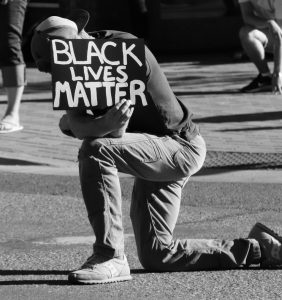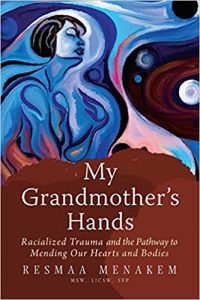Educate
We’re listening. Help us learn.
June 7, 2020It has taken the massacre of so many black bodies to get us to this moment.
Thank you, Kimberly, for educating.
https://twitter.com/trevornoah/status/1269291643842289666?s=11
And Elmo.
https://www.youtube.com/watch?v=aGcGXXCRrow
White Body Supremacy
“…the term “white body supremacy” — I’m operationalizing it. The white body is used to hearing things that make it comfortable. And so when you say something like ‘white supremacy’ especially here in Minnesota, everybody goes, “Yes, absolutely. Yeah, yeah, absolutely.’ And then what happens is, it goes — just the term, “white supremacy,” is a very intellectual term. It doesn’t land in the body.
-Resmaa Menakem, therapist and trauma specialist in Minneapolis who teaches across the U.S.
[On Being]
Educate, learn, listen, align, act.
June 6, 2020Hunger Coalition in Blaine County, Idaho:
‘Speaking out against systemic racism with people across the nation and across the political spectrum aligns with our values, but we must also act on our words. To that end, The Hunger Coalition supports peaceful nonviolent protest and advocacy as a way to:
- Stand up for fundamental American principles of fairness and justice.
- Affect change at the system level.
- Raise awareness around issues that affect the people we serve.
- Honor our values of equity and inclusiveness.
- Speak out against discrimination suffered by people of color, including police brutality.
- Ensure The Hunger Coalition is seen as a safe place for all people to access food, regardless of race, class, gender, sexual orientation, ethnicity, citizenship, disability, or religion.
Please consider joining us in the following actions:
Educate: read, read, and read more about how racial injustice is rampant in every corner of our country. Share what you learn with others.
Demonstrate: peaceful protest is fundamental to our democracy and how we can shine a light on discrimination.
Donate: make a donation to organizations working to heal our nation and bring us all together.
Organize: join forces with people on a shared mission. Petition, canvass, campaign, and put pressure on our leadership to enact change.
Vote: vote for candidates at the local, state, and national level who support policies that make life better for people of color. There is an election on November 3, 2020. Research the candidates and vote.’
-Jeanne Liston, Executive Director at the Hunger Coalition
[Image: Deborah Knapp]
Listen.
Krista Tippet, On Being:
‘…horrific trauma inflicted on black bodies in the “new world” of America — which, as Langston Hughes wrote, “never was America to me.” We are all literally carrying – breathing, reliving, and so repeating — much that didn’t happen to us personally. It’s one way to finally grasp why talking about race, and “teaching our brains to think better” about race, has fallen brutally, tragically short: “The vital force behind white supremacy,” Resmaa Menakem writes in his extraordinary book My Grandmother’s Hands, “is in our nervous systems.”
Resmaa Menakem is a teacher and visionary in this city (Minneapolis), though I only became aware of his groundbreaking work a few months ago. Just before the pandemic sent us into lockdown, I sat across from him in our studio on Loring Park. He watched me as closely as he listened to my words. He caught me bracing at the term “white supremacy,” and taught me that noticing such bracing is exactly where I have to begin to live differently. He’s drawing on knowledge we’re just now gaining about systems and processes in our bodies that we’re only now learning to see: vagus nerve, psoas muscle, trauma, epigenetics. He makes a stunning connection between generations of trauma that white bodies inflicted on each other in the centuries we call the Dark Ages and the generations of horrific trauma inflicted on black bodies in the “new world” of America.
At the On Being Project right now we are listening, and listening again, to Resmaa as well as others who’ve been teaching us in recent years and to whom we will turn for new wisdom in this time. We’re trying to carry our questions with as much humility as we carry what feel like insights and answers.’

